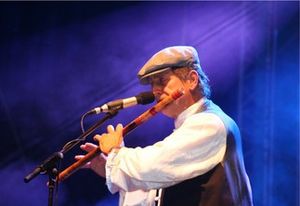One night on a recent trip to Lisbon, I heard a flute playing somewhere near the flat in which I was staying. I followed my ears and was delighted to find myself at a performance by Rao Kyao, whom I had seen in Bombay in the early 1990s.
 Rao, who plays the saxophone and the flute, has been a frequent visitor to India — and to Bombay. The first time he came to India was in 1980, to perform at the Jazz Yatra. He became so entranced by the sound of the bansuri that he became a student of Raghunath Seth and spent a lot of time in Bombay over the next decade.
Rao, who plays the saxophone and the flute, has been a frequent visitor to India — and to Bombay. The first time he came to India was in 1980, to perform at the Jazz Yatra. He became so entranced by the sound of the bansuri that he became a student of Raghunath Seth and spent a lot of time in Bombay over the next decade.
He used his lessons to enhance the sonic textures of fado, the emotion-drenched song-form beloved in Lisbon, adding the bansuri to the standard ensemble of Portuguese and Spanish guitar. He has also attempted to foreground fado’s Eastern influences, especially its Arab and Indian traces. This tune, with the vocalist Deolinda Bernardo, is called Canta-se o Fado.
About a decade before this track, though, Rao Kyao recorded this tribute to the city that decisively changed his musical direction: Bombaim.
Here, meanwhile, is a diary I wrote for Outlook about my trip.

